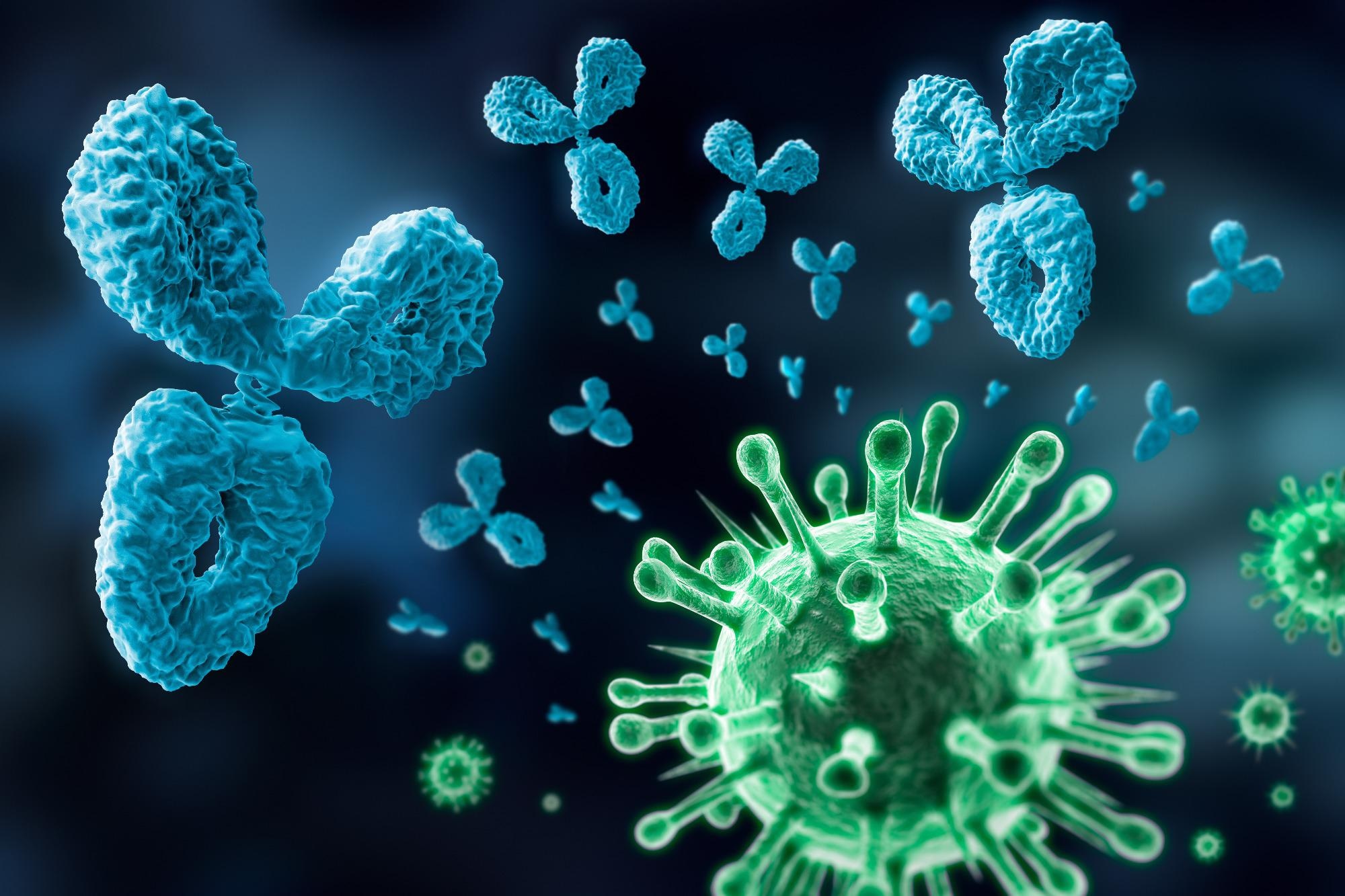The ongoing coronavirus disease 2019 (COVID-19) pandemic, caused by the novel coronavirus, namely, severe acute respiratory syndrome coronavirus 2 (SARS-CoV-2), has drastically affected the global healthcare system and economy. SARS-CoV-2 causes asymptomatic to severe infection, which sometimes results in death. Scientists observed that active replication of the virus occurs in the early stage of the infection, whereas the host immune system critically functions in the later phase of the infection. This is why researchers strategized on using antiviral agents to target SARS-CoV-2 at its early stage of infection.
 Study: Relationship between SARS-CoV-2 antibody titer and the severity of COVID-19. Image Credit: peterschreiber.media/ / Shutterstock
Study: Relationship between SARS-CoV-2 antibody titer and the severity of COVID-19. Image Credit: peterschreiber.media/ / Shutterstock
Background
Several studies have assessed the host immune response along with the COVID-19 disease progression. These studies have stated that although the immune system plays a vital role in protecting an individual from the disease, overpowering immune responses, e.g., cytokine storm, negatively affect the host.
Scientists stated that the role of antibody-based immune responses in COVID-19 disease is not well understood. Prior studies have correlated severely infected individuals with COVID-19 with high levels of SARS-CoV-2 antibodies. However, it is not well understood if high titers of SARS-CoV-2 antibodies exacerbate the clinical outcome of the disease, or if severe illness results in the production of a high concentration of antibodies.
A New Study
Addressing the above-mentioned research gap, scientists have focused on determining the cause-effect relationship between SARS-CoV-2 antibody titers and COVID-19 disease severity. The study is published in the Journal of Microbiology, Immunology and Infection.
In this study, researchers recruited hospitalized COVID-19 patients between February 2020 and August 2020. They measured neutralizing antibody (NAb) and anti-receptor-binding domain (RBD) antibodies from the blood samples obtained from the participants. The scientists further estimated the chest radiograph (CXR) scores to determine the severity of the disease.
Key Findings
The study reported a high titer of antibodies in elderly patients with COVID-19. These patients suffered from pneumonia and needed oxygen support. Scientists compared the peak time of COVID-19 antibody levels and CXR scores and observed that CXR scores maximized significantly earlier than NAb and anti-RBD antibody titers. Since a direct correlation was found between the highest CXR score and the highest level of SARS-CoV-2 specific antibodies, the authors concluded that the production of high antibody titers resulted from severe clinical outcomes.
Typically, when a human body is invaded by a pathogen (e.g., a virus), the innate and adaptive immune system protects from the virus. Several studies have indicated that the cellular immune system is involved in clearing pathogens from the body, while humoral immunity primarily protects against new infection.
As prior studies have linked a high production of SARS-CoV-2 antibodies with the manifestation of severe disease or mortality, it has led to a perception that overwhelming production of SARS-CoV-2 antibodies promotes disease progression via antibody-dependent enhancement (ADE). Similar observations have been recorded for the dengue virus. Interestingly, studies related to assessing the efficacy of convalescent plasma therapy for COVID-19 patients revealed no adverse effects when the patients were treated with a high titer of SARS-CoV-2 antibodies. Furthermore, animals immunized with the COVID-19 vaccine did not exhibit any signs of ADE. These findings prove that ADE is not the possible cause of COVID-19 disease progression.
Scientists believe that uncontrolled replication of the virus and hyperinflammatory conditions could be the reason for the production of high levels of SARS-CoV-2 antibodies in severely infected COVID-19 patients. In this study, the scientists speculated that high levels of NAb and anti-RBD antibodies were elicited owing to a high viral load, dysregulated immune responses, and uncontrolled viral replication in severely infected patients.
The study reported that elderly patients exhibited a higher level of SARS-CoV-2 antibodies compared to younger patients. This result implies that elderly patients are more vulnerable to severe infection due to the production of high titer of SARS-CoV-2 antibodies. Although researchers studied the changes in the proinflammatory cytokines, the results were obtained for only fifteen patients. This is the reason why they failed to draw a robust conclusion regarding the association between proinflammatory cytokines, T- and B-cell immunity, and COVID-19 disease severity. Future research should make use of a larger sample size to determine whether these relationships exist.
Conclusion
The authors highlighted some of the limitations of the study, which include its relatively small study cohort containing participants from a single hospital. They did not measure the neutralization capability of the SARS-CoV-2 antibody, and as a result, they failed to confirm if a high concentration of Nab has a more significant effect on the neutralization of the SARS-CoV-2 virus. In this study, high titers of SARS-CoV-2 antibodies were strongly related to severe COVID-19 manifestation. Understanding the underlying mechanisms behind such an association would be a crucial step toward developing novel vaccines and therapeutics to prevent, cure, and treat SARS-CoV-2 infections.